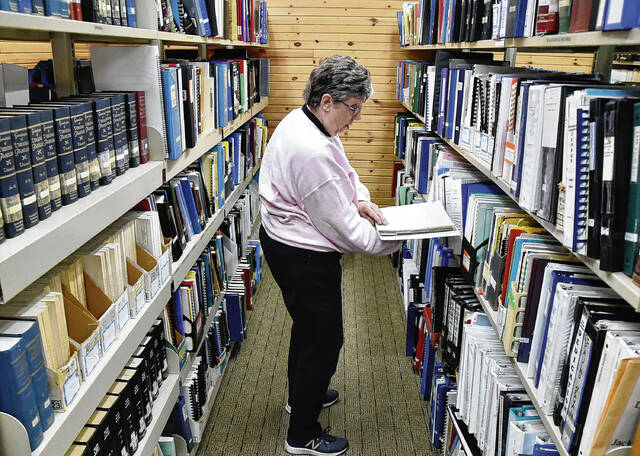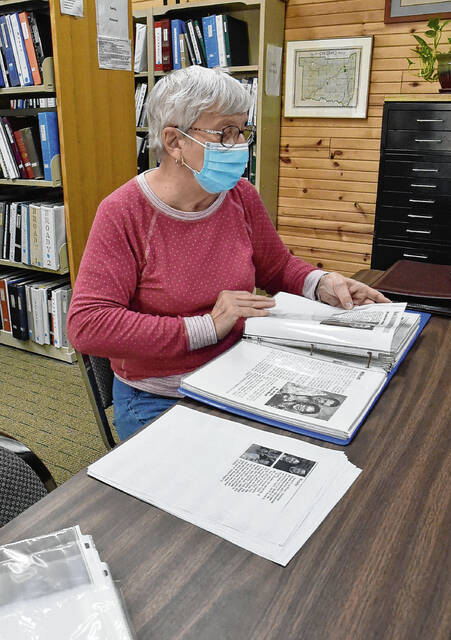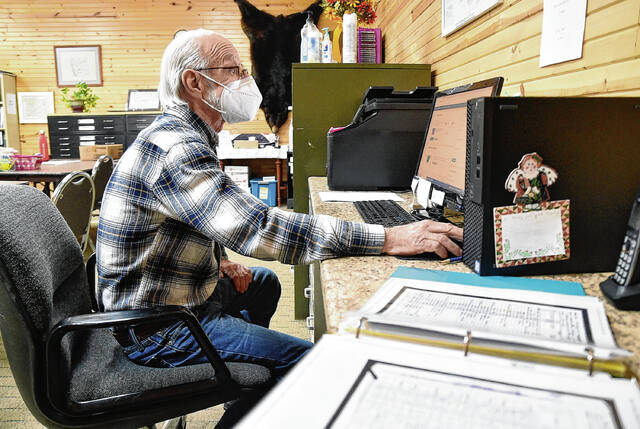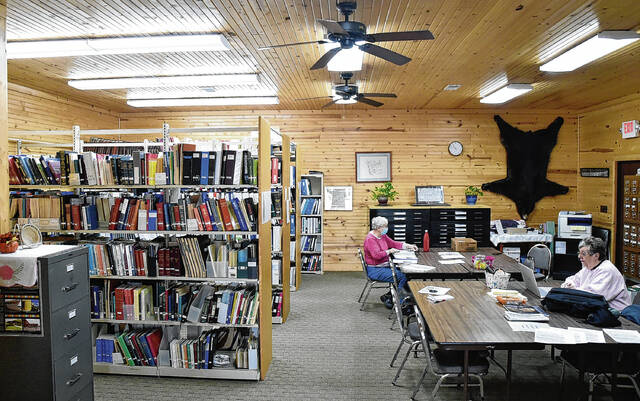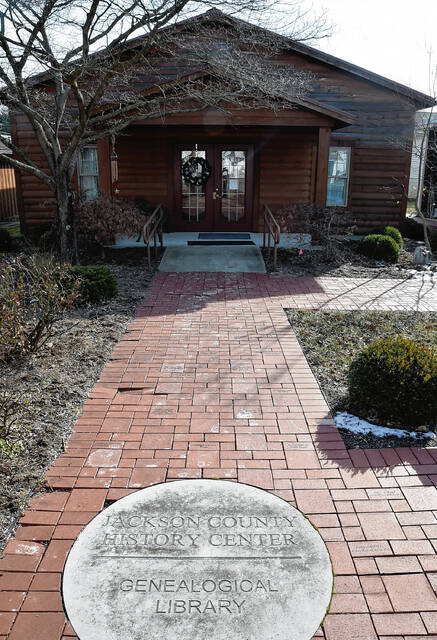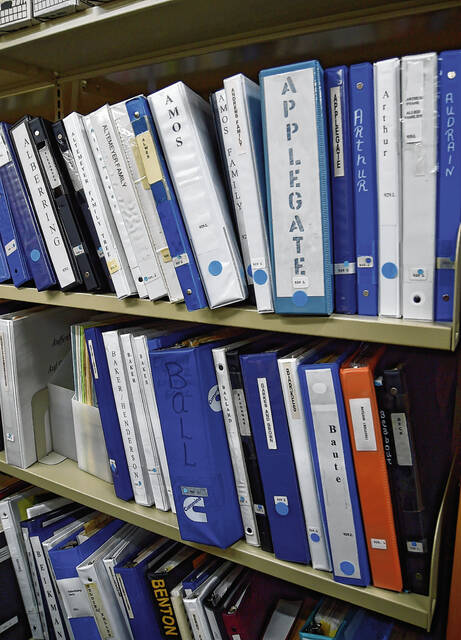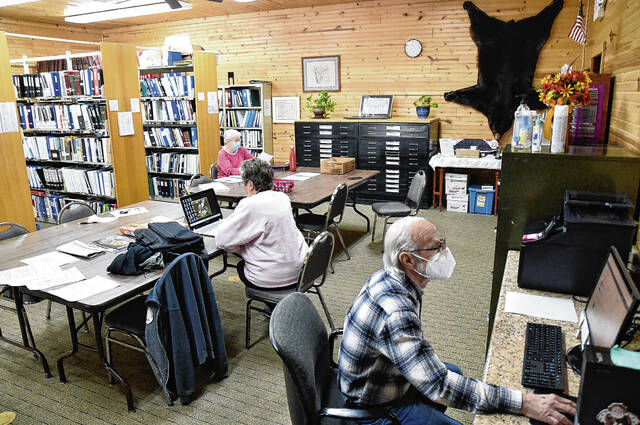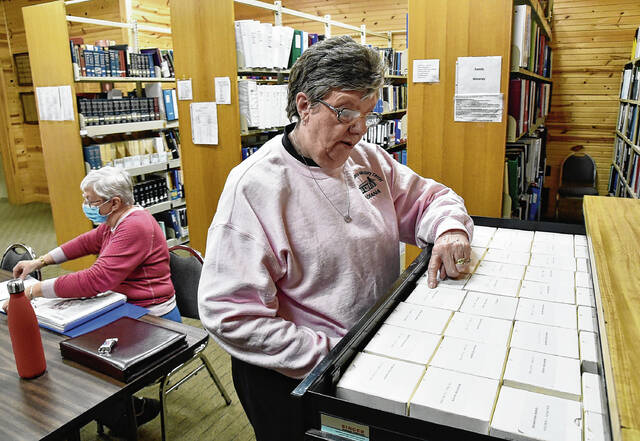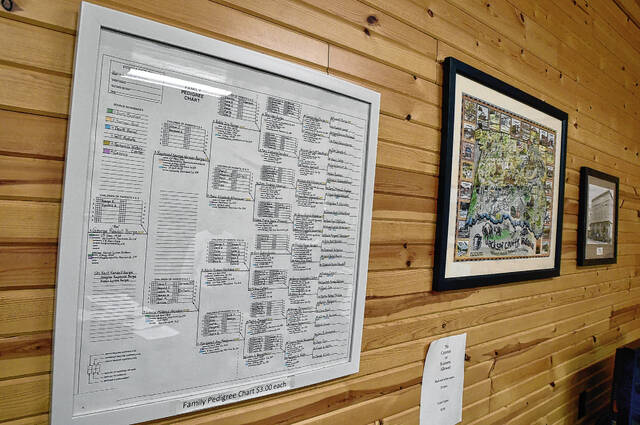BROWNSTOWN — Margo Brewer always heard she had a relative who was part of the John Dillinger gang.
In 1924, Dillinger, an Indianapolis native, robbed a grocery store and was caught and jailed. He escaped, and he and his gang headed to Chicago to put together one of the most organized and deadly bank robbing gangs in the country, continuing on a crime spree until arrested, according to history.com. This pattern continued until he was shot by the FBI in 1934.
Brewer’s cousin said there was a story in the Columbus newspaper that revealed the name of her relative: Clyde Steinbarger.
One morning while volunteering in the genealogy library at the Jackson County History Center in Brownstown, Brewer shared information about her relative with a couple of fellow volunteers, and they found the story on the newspaper archive website newspapers.com.
It turns out Steinbarger was one of the most notorious safe crackers in Indiana and had been connected to the Dillinger gang.
He was tried in Jackson County and sentenced to life imprisonment but got out in three years. He, however, was killed at a grocery store in Leesville.
“He and his accomplice got in and cased the joint through the week, and the owner was suspicious, so he had called the police,” she said.
State police watched the place all week, and after the store closed at noon on Sunday, Steinbarger and his accomplice broke in. When they saw a car slowly drive by outside, both men jumped behind the counter and landed on top of a state policeman, who shot Steinbarger. The accomplice, meanwhile, fell to the floor, hit his head, knocked himself unconscious and was arrested.
Looking at a picture of Steinbarger, Brewer said she wondered how her grandfather’s sister ever got hooked up with him.
To this day, Brewer hasn’t learned to crack a safe like her long-lost relative.
“It’s not in my direct line. He married into the family,” she said, smiling. “That’s the fun of genealogy. You never know what you’re going to find.”
Fellow volunteers Judy Stockhoff and Jeff Wray agreed.
“You don’t want to start your genealogy if you don’t want to learn something you don’t need to know,” Wray said, smiling.
“It’s addictive,” Stockhoff said.
Researching genealogy is among the many offerings at the Joe E. Robertson Genealogical Library on the history center campus at 105 N. Sugar St.
Volunteers can help people with their research through the history center’s free access to newspapers.com and ancestry.com, and there also are shelves full of books and binders with various types of historical documents.
Once a person walks into the library, they are asked to sign a guestbook and share who they are researching.
Then they either pay $3 per day to research or become a member for $15 (individual) or $25 (family) for yearlong access to the library. If you need a copy of a document, it’s 25 cents for black and white or $1 for color.
“Once you are a member, you can come in any time,” Brewer said. “Even if people that are from out of state are going to come in and work for the week, it’s less expensive (to become a member).”
Stockhoff said she subscribes to ancestry.com at home and it’s expensive, so it’s nice that the history center offers it for free for people to do their research.
“It’s very rewarding to help them,” Stockhoff said.
Wray cautions that some genealogy websites don’t always have accurate information.
“You can go on there and get family trees that people have put in, but you don’t know where they got their information. Sometimes, people just get on there and somebody has already got (information) on there, and they will just copy it and they think it’s right,” he said. “So in order to be thorough, you have to show birth certificate, death certificate, marriage license.”
Brewer suggested downloading a family tree program on a computer, collecting bits and pieces of information, organizing it and bringing the computer to the genealogy library to get help from a trained volunteer.
Along with the two websites, there are many other research options at the library.
That includes more than 1,000 family history booklets that have been donated by families over the years. Many have ties to Jackson County, but Brewer said that’s not required. Some of the booklets are handwritten, while some are typed, and they include such things as pictures, death records and obituaries.
There also are books with birth, death, marriage, cemetery and funeral home records. That includes funeral home records from other Indiana counties and other states.
Plus, there are booklets with copies of wedding anniversary announcements that run in the newspaper and copies of obituaries from newspapers.
Miscellaneous research books, yearbooks from county schools, photo albums, family reunion books, club scrapbooks, church records and German ancestry resources are available on the shelves, too.
“We don’t let any of these leave,” Brewer said. “You cannot copy the whole book. You can copy what information you need.”
Also in the library, there are cabinets with microfilm from local newspapers and a microfilm reader that can be used for research.
If someone lives out of state, they can email [email protected] and receive help with their research.
The history center also offers the Jackson County Pioneer Society, which recognizes any person showing direct descent from someone living in the county in one of four time periods: Before 1820 (First Families), 1820 to 1850 (Founders), 1851 to 1880 (Settlers) and 1881 to 1910 (Builders).
Application forms are available at the genealogy library. New members are inducted each fall during the history center’s Pioneer Dinner.
A couple of things that genealogy library visitors can take home at a small cost are a Jackson County plat map, a current map of Jackson County and a family pedigree chart.
Currently, the library is open from 9 a.m. to 4 p.m. Mondays, Tuesdays and Fridays. Due to the COVID-19 pandemic, it’s recommended that visitors wear a face mask and practice social distancing.
Brewer said before the pandemic, the library averaged around 300 visitors per year. Since the pandemic started, though, the number of visitors has dropped, and she said there usually aren’t many people there at a time.
“Wintertime is a good time to start,” Brewer said of stopping by to do some research. “It’s cold outside. It’s warm in here.”
The history center is seeking volunteers to work half-days (9 a.m. to 12:30 p.m. or 12:30 to 4 p.m.) in the genealogy library or help during the upcoming fourth grade tours of the campus.
“When I volunteer in here, I bring my own family research in and work on it,” Brewer said. “Then if somebody comes in and needs help, we’re here to help them.”

